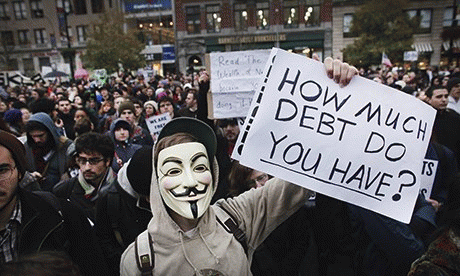Reprinted from ahaadotme.wordpress.com
The essential element of the socialist ideal as Chomsky says remains: to convert the means of production into the property of freely associated producers and thus the social property of people who have liberated themselves from exploitation by their master, as a fundamental step towards a broader realm of human freedom.
Pfft you can hear the neo-cons snorting, why shouldn't the rich be allowed to keep the product (i.e.. cash) of their labours? After all they earned it!. The question of whether they earned it or stole it is central to the Occupy movement I think.
The essential point of social equality is that everyone including the administrator of an organisation, share in the wealth that it produces. The manager no doubt would have a bigger expense account than many workers but that is all. The workers are, in an ideal society, also the shareholders.
This concept could also be known as anarcho-syndicalism in a pre-socialistic society because it reflects the belief that no person on this planet should have a master.
There would be no discussion about the size of a CEO's bonus because all would receive the same as managers are not by definition somehow 'better human beings'. No person then would be economically enslaved by another.
There is also a contradiction here, we assume that capitalism is operationally different from socialism when in fact money is the end result of both enterprises and products are still bought and sold.
It is theoretically possible also to talk of social equality in a way that is fundamentally different than capitalism. This would be an economy based entirely upon resources with no Central Banks, Parliaments, Congress etc. These would be replaced by 'constituent assembly's' or something similar.
Such an assembly would be more directed toward solving the problems of supply and demand to its own citizens and sharing this technology with other sovereigns than it would be interested war and other foreign adventures, there would be no capitalistic advantage to war.
However, I wonder if labels like socialism so commonly derided, misunderstood, and in my view deliberately falsely associated with communism would stand a chance in the world of Realpolitik. .
I suspect not.
There is a link, at least theoretically, between socialism and capitalism which is widely accepted.... and that's 'democracy'.
There is a further link between democracy and Thomas Paine who debatably was one of the most influential founding fathers. He was sidelined later on mainly for being more outspoken about being anti-religious than the others, but also because he believed that democracy was for everyone and not only 'the most capable set of men'
His aims were it could be argued essentially socialistic and yet you can refer to him without employing that term and garner much support from the American people. A focus on the works of Paine would be one way of uniting 'Patriots' and socialists without the need to refer to either the left or right in political terms.
Perhaps the issue at hand then is that Occupy and other potential reformers first need to demonstrate that an inclusive democracy does not exist in the US. And then once achieved show concisely that the diversion from democracy to corporate totalitarianism is not what the founding fathers intended..
Many presidents since Washington have in have fact specifically warned against this development, as well as the power of the banks. And since Eisenhower of course also warned against the dominance of the military industrial complex.
(Note: You can view every article as one long page if you sign up as an Advocate Member, or higher).






